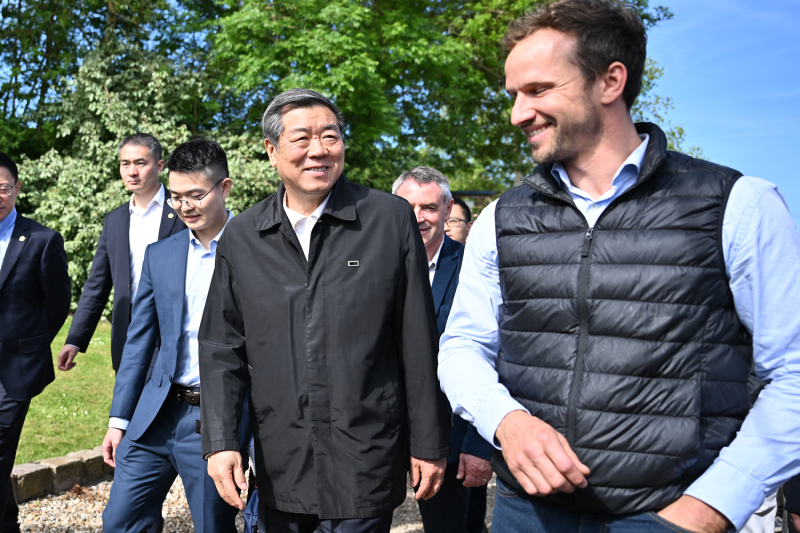China’s Economic Officials Are Trying to Speak Like Human Beings

China’s Economic Officials Are Trying to Speak Like Human Beings
A softer communication approach may have helped the Geneva talks.
Chinese Vice Premier He Lifeng (center) visits the farm of local livestock breeder Clement Vandecandelaere (right) in Harquency, northern France, on May 13. Lou Benoist/AFP via Getty Images
When Chinese Vice Minister of Commerce Li Chenggang told reporters in Geneva that “a good meal is worth the wait,” it was a moment that stood out—not because the phrase was new, but because he said it in a tone and rhythm that made him sound like a human being. That’s unusual for a Chinese spokesperson. In a system known for rigid talking points and carefully vetted language, the unscripted familiarity of that remark carried weight. That moment is part of a subtle shift in how China’s economic leadership communicates.
Senior officials—particularly those in financial and trade-facing roles—are increasingly adopting a more conversational, measured, and relatable way of speaking in public. In China, this evolution is captured in the phrase “shuo renhua” or “speaking like a human being.”
When Chinese Vice Minister of Commerce Li Chenggang told reporters in Geneva that “a good meal is worth the wait,” it was a moment that stood out—not because the phrase was new, but because he said it in a tone and rhythm that made him sound like a human being. That’s unusual for a Chinese spokesperson. In a system known for rigid talking points and carefully vetted language, the unscripted familiarity of that remark carried weight. That moment is part of a subtle shift in how China’s economic leadership communicates.
Senior officials—particularly those in financial and trade-facing roles—are increasingly adopting a more conversational, measured, and relatable way of speaking in public. In China, this evolution is captured in the phrase “shuo renhua” or “speaking like a human being.”
On the surface, it might look like a stylistic adjustment. But underneath, it reflects a deeper recalibration in how the leadership understands its relationship with markets, investors, and credibility itself.
Nowhere is this shift more evident than with Vice Premier He Lifeng, who has assumed a leading role in China’s international economic engagement. A longtime associate of President Xi Jinping, He has traditionally been seen as a loyal executor of top-level directives—a disciplined Communist Party technocrat with little appetite for public-facing diplomacy.
But in the past year, as Reuters exclusively reported, something has changed. He has met with more than 60 foreign business delegations, a sharp increase from the year prior. Many of those who’ve sat down with him describe a shift in tone: more responsive, less scripted, and notably more comfortable explaining China’s reasoning in ways that resonate with Western audiences.
His English remains limited, and he is not widely seen as a policy innovator, but his presence and voice in economic diplomacy have grown more confident. That, in itself, suggests that the leadership is placing increasing value on guiding interpretation—not just announcing policy, but also managing how it lands.
He even received praise from his American counterpart. As China and the United States wrapped up their first high-level trade talks since the U.S. president’s so-called tariff “Liberation Day,” on April 2, U.S. Treasury Secretary Scott Bessent described He as “a very skilled negotiator.” He added, “There was no sense of anxiety … there is a sense of moving forward. There is a sense of mutual respect. There is a sense that we had shared interests.”
Managing market expectations is as much art as science. It’s not just about which policies are enacted, but also how intentions are communicated—and how credibly. Former U.S. Treasury Secretary Hank Paulson, speaking to Congress during the financial crisis in 2008, illustrated this with an unusually vivid metaphor: “If you’ve got a squirt gun in your pocket, you may have to take it out. If you’ve got a bazooka, and people know you’ve got it, you may not have to take it out.”
In moments of stress, the appearance of overwhelming force—delivered through clear and confident messaging—can calm markets before any action is even taken. It’s a form of preemptive reassurance that has long shaped how central banks communicate in advanced economies.
For Beijing, this logic is still relatively new. Until recently, changes to the benchmark interest rates of the People’s Bank of China were posted quietly on the central bank’s website, often without explanation, context, or public briefing—let alone a press conference to take questions. Broader fiscal policy announcements have typically been delivered through dense party language, steeped in abstract slogans and ideological framing. Phrases such as “coordinating development and security” may have an internal logic in a political environment where deviating from the language deemed correct can have serious consequences, but for external observers—and increasingly, for domestic markets—they often obscure priorities more than they clarify.
In recent months, Beijing has signaled a more expansive fiscal posture and a willingness to lean more heavily on monetary easing. But those signals, wrapped in rhetorical ambiguity and lacking a direct articulation of timelines, failed to shift expectations in any durable way.
Beijing’s rigid political calendar adds to the challenge: Specific figures for fiscal support require budgetary procedure and cannot be communicated beforehand to the market. Concrete measures and follow-ups are not developed at the leadership level but are instead delegated to relevant ministerial and provincial agencies. Yet few outside China’s bureaucratic circles can clearly delineate this process.
As a result, market skepticism has persisted—not just due to doubts about political will or implementation capacity, or the lack of specifics, but also because the message itself hasn’t connected. The failure wasn’t just one of policy; it was often one of persuasion.
In fact, it has become standard practice for China market analysts to leaf through official documents, parsing minute differences in wording—between “substantial,” “significant,” and “forceful”—in an effort to decipher what has changed and what remains the same.
This paralysis is a headache. China’s economic challenges are both structural and immediate. After decades of robust growth, the path ahead has grown more complex: Deflationary pressures, an unresolved real estate downturn, weak private-sector sentiment, and trade tensions have all contributed to a sense of uncertainty. At the same time, the global investment community has become more attuned not just to China’s policy content, but also to its signals, silences, and inconsistencies.
China’s zombie-like media ecosystem compounds the problem. Unlike in the United States, where economic and financial officials frequently make media appearances to clarify policy intent, address concerns, and actively respond to economic data, China’s media remains tightly controlled.
Beijing seems to be increasingly aware of this. In March, Premier Li Qiang’s government work report named “boosting asset prices” as a key priority—a first in the history of the Two Sessions, the annual meetings of China’s rubber-stamp parliament. Policy priority doesn’t automatically translate into policy reality. But it was significant. In China’s macroeconomic policy framework, financial markets have traditionally been viewed as reflections of fundamentals, not as targets in themselves. And as market practitioners know, asset prices are closely tied to perceptions of what’s coming—the expectations shape real prices.
In April, the State Council convened a high-level internal seminar focused entirely on “expectation management”—a phrase that, until recently, had little presence in high-level official vocabulary. The shift is telling: China’s top leadership is beginning to treat the management of perception and confidence not as peripheral concerns, but as essential components of economic governance.
It’s unclear whether China’s economic and financial officials have received explicit instructions to improve their communication skills. But there are emerging signs that some of the country’s key economic and trade officials—especially those with external-facing roles—are deliberately learning and adapting.
Pan Gongsheng, the governor of the People’s Bank of China, recently shared that he watches CNBC every morning on his way to work, specifically to follow how market analysts interpret U.S. Federal Reserve Chair Jerome Powell’s remarks. That detail, casually inserted into a press conference, was clearly intentional. For a Chinese central banker, acknowledging such a media habit is unusual. China’s top banker is paying attention—not just to the macroeconomic environment, but to the expectations and narratives that shape it—and learning to manage those expectations in real time by watching U.S. news.
Others are adjusting their tone as well—none more visibly than Wu Qing, the chairman of the China Securities Regulatory Commission (CSRC). At a May press conference unveiling a new package of financial support measures, Wu marked the rollout of China’s mutual fund reform by invoking a name rarely uttered in party briefings: American billionaire Warren Buffett.
“Buffett may be retiring,” Wu said, “but value investing, long-term investing, rational investing, and delivering returns to investors—those principles won’t retire.” The line wasn’t just rhetorical flair. It was a deliberate effort to frame China’s reform agenda in globally familiar language—and to signal that the CSRC is positioning itself as a guardian of long-term market health, not just a compliance enforcer.
A few months earlier, Wu struck a similar tone at the National People’s Congress, where he quipped, “If you’re not talking about DeepSeek these days, you’re not fashionable.” It was half-joke, half-signal: a nod to AI’s rising status as China’s investment darling and a reminder that senior regulators are increasingly expected to speak in ways that resonate.
None of this marks a relaxation of message control. But it does show a growing recognition that trust isn’t just earned through policy—it’s also conveyed through tone. A few well-timed lines, delivered with confidence and fluency, can go further than pages of boilerplate.
And none of this should be overstated. China’s policymaking system remains opaque, centralized, and resistant to institutional transparency. The space for independent analysis has narrowed. Press conferences are still tightly managed. And while the language may be softer, the strategic goals remain unchanged.
Vice Premier He, for instance, continues to defend China’s export-led model and has shown little openness to recalibrating around domestic consumption. Messaging is evolving, but it’s still happening within the same political constraints. Many of China’s economic and financial mandarins still sound largely scripted and robotic by Western standards. That may help explain why even small changes in tone now feel significant.
Even so, the shift in tone deserves attention. In a system that remains politically rigid, clearer communication is one of the few areas where adaptation is visible. The trend won’t resolve China’s structural economic challenges, but it can help calm volatility, anchor expectations, and give policymakers more space to act.
It may also reduce the risk of misinterpretation—a risk that has grown as market participants, both domestic and foreign, grow more skeptical of Beijing’s intentions. We may be seeing early signs of a modest but meaningful adjustment in how the leadership is trying to rebuild market confidence by articulating its goals with greater clarity and intent. That shift matters, especially in an environment where China’s policy direction has often been difficult to read.
Ultimately, this isn’t about officials becoming more transparent in a Western sense. It’s about Beijing learning that, in a more exposed and more reactive global economy, ambiguity can be a liability. When credibility becomes a variable in economic outcomes, managing tone becomes part of the job.
And in that context, speaking more plainly isn’t just a stylistic upgrade—it’s a form of risk management.
Li Chenggang’s proverb in Geneva might have seemed like a throwaway line. But it worked because it sounded, well, human. As China navigates a more uncertain economic future, it may need more of that.
Lizzi C. Lee is a fellow on Chinese economy at the Asia Society Policy Institute’s Center for China Analysis.
More from Foreign Policy
-

Indian Air Force personnel stand in front of a Rafale fighter jet during a military aviation exhibition at the Yelahanka Air Force Station in Bengaluru. A Tale of Four Fighter Jets
The aircraft India and Pakistan use to strike each other tell a story of key geopolitical shifts.
-

A cardinal in a black robe with red sash with hands folded in front of him walks past a stage and steps. Conclave Sends Message With American Pope
Some cardinals had been agitating for U.S. leadership to counter Trump.
-

An illustration shows red tape lines crossing over and entrapping a semiconductor chip. Is It Too Late to Slow China’s AI Development?
The U.S. has been trying to keep its technological lead through export restrictions, but China is closing the gap.
-

A man watches a news program about Chinese military drills surrounding Taiwan, on a giant screen outside a shopping mall in Beijing on Oct. 14, 2024. The Pentagon Fixates on War Over Taiwan
While U.S. military leaders fret about China, Trump has dismissed the Asia-Pacific.






Join the Conversation
Commenting on this and other recent articles is just one benefit of a Foreign Policy subscription.
Already a subscriber?
.
Subscribe
Subscribe
View Comments
Join the Conversation
Join the conversation on this and other recent Foreign Policy articles when you subscribe now.
Subscribe
Subscribe
Not your account?
View Comments
Join the Conversation
Please follow our comment guidelines, stay on topic, and be civil, courteous, and respectful of others’ beliefs.
Change your username |
Log out
Change your username:
CANCEL
Confirm your username to get started.
The default username below has been generated using the first name and last initial on your FP subscriber account. Usernames may be updated at any time and must not contain inappropriate or offensive language.